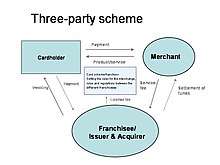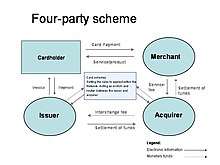Card scheme
Card schemes are payment networks linked to payment cards, such as debit or credit cards, of which a bank or any other eligible financial institution can become a member. By becoming a member of the scheme, the member then gets the possibility to issue or acquire cards operating on the network of that card scheme.
Types
The card schemes come in two main varieties - a three-party scheme (or closed scheme) or a four-party scheme (or open scheme).
Three-party scheme

A three-party scheme consists of three main parties as described in the adjacent diagram.
In this model, the issuer (having the relationship with the cardholder) and the acquirer (having the relationship with the merchant) is the same entity. This means that there is no need for any charges between the issuer and the acquirer. Since it is a franchise setup, there is only one franchisee in each market, which is the incentive in this model. There is no competition within the brand; rather you compete with other brands.
Examples of this setup are Diners Club, Discover Card, and American Express, although in recent times these schemes have also partnered with other issuers and acquirers in order to boost their circulation and acceptance, and Diners Club now operates as a four-party scheme in many regions.
Four-party scheme

In a four-party scheme, the issuer and acquirer are different entities, and this type of scheme is open for other institutions to join and issue their own cards. This is the type of card scheme used by brands such as Visa, Mastercard, Verve Card, UnionPay and RuPay (Indian). There are no limitations as to who may join the scheme, as long as the requirements of the scheme are met.